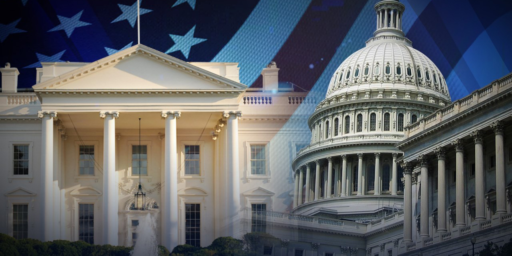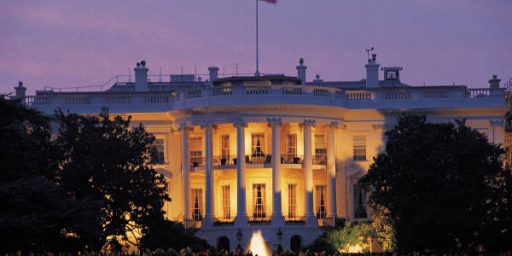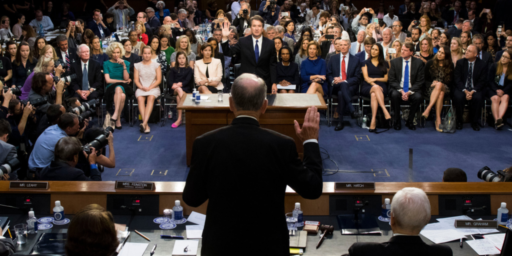Bush Snubs Congressional Subpoenae
President Bush is refusing to honor a congressional subpoena of documents for former White House staffers.
President Bush, moving toward a constitutional showdown with Congress, asserted executive privilege Thursday and rejected lawmakers’ demands for documents that could shed light on the firings of federal prosecutors. Bush’s attorney told Congress the White House would not turn over subpoenaed documents for former presidential counsel Harriet Miers and former political director Sara Taylor.
In reaction, Senate Judiciary Chairman Patrick Leahy accused the administration of shifting “into Nixonian stonewalling” and revealing “disdain for our system of checks and balances.”
“With respect, it is with much regret that we are forced down this unfortunate path which we sought to avoid by finding grounds for mutual accommodation,” White House counsel Fred Fielding said in a letter to Leahy and the chairman of the House Judiciary Committee. “We had hoped this matter could conclude with your committees receiving information in lieu of having to invoke executive privilege. Instead, we are at this conclusion.”
While the White House’s claim that the work product of presidential staffers has a higher degree of protection than that of cabinet officials requiring Senate approval, they are on shaky ground, indeed, in claiming executive privilege here.
Columbia lawprof Michael Dorf outlines the contemporary consensus:
Presidents often assert executive privilege even if the information or documents sought are not matters of national security. They argue that some degree of confidentiality is necessary for the Executive Branch to function effectively. Key advisers will hesitate to speak frankly if they must worry that what they say will eventually become a matter of public record.
The Supreme Court considered this argument in the 1974 case of United States v. Nixon. A grand jury convened by Watergate special prosecutor Leon Jaworski issued a subpoena to President Nixon requiring that he produce Oval Office tapes and various written records relevant to the criminal case against members of Nixon’s Administration. Nixon resisted on grounds of executive privilege.
The Court recognized “the valid need for protection of communications between high Government officials and those who advise and assist them in the performance of their manifold duties.” It noted that “[h]uman experience teaches that those who expect public dissemination of their remarks may well temper candor with a concern for appearances and for their own interests to the detriment of the decisionmaking process.”
Nonetheless, the Justices concluded that the executive privilege is not absolute. Where the President asserts only a generalized need for confidentiality, the privilege must yield to the interests of the government and defendants in a criminal prosecution.
Congress has a legitimate oversight responsibility with regard to the DOJ and U.S. Attorneys and they have a more than reasonable basis for launching an inquiry into wrongdoing. Unless the White House concocts some sort of national security rationale for not turning over the documents, they’ll ultimately lose this in court. Of course, time is on their side and they may well be able to run out the clock.






So President Bush goes all out to protect his bumbling Attorney General while leaving Scooter Libby hanging out to dry. Talk about misplaced loyalty.
Bush has packed the court with his guys whose understanding of the Constitution is remarkably malleable. I expect that if this goes to the Supreme Court, Bush wins. In a 5-4 split, naturally.
The clock may well run out as far as Bush and Cheney are concerned, but there are many other people whose futures and careers aren’t going to expire on January 20, 2009.
Like Michael Dorf said when the congress convenes a Grand Jury in reference to a criminal prosecution then the subpoenaed documents should be turned over. Seeing as how there is no Grand Jury and this is just a leftest fishing expedition I think not.
Your reliance on Nixon inapposite. The congressional subpoenas at issue here are not in service of a criminal prosecution.
Also, the composition of the Supreme Court has changed since 1974. And as we have seen even today, this Court doesn’t feel especially constrained by the decisions of its predecessors.
I put it to you: Do you think our justices would answer a congressional subpoena for documents written by their law clerks? No, you say? You are correct, and you understand the concept behind executive privilege. Law clerks — like U.S. attorneys — serve at the pleasure of their boss.
Congress can take a hike.
As much as it pains me to admit it, this has political question written all over it.
If there really is a legitimate case for criminal obstruction of justice (and I think there is, at least as a discovery standard of “reasonably calculated to lead to admissible evidence” goes), Congress should let fly with a special prosecutor. Otherwise, both branches will continue to waste valuable time.